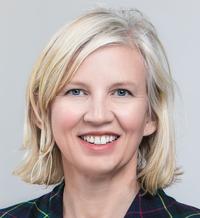Fleur Johns
Visiting Professor of Law from the University of New South Wales (UNSW Sydney), Australia
Digital technology is remaking global legal relations in ways still not well understood.
Professional biography
I am Professor in the Faculty of Law at UNSW Sydney, Australia. Before joining UNSW, I was Co-Director of the Sydney Centre for International Law at the University of Sydney and I have also held visiting appointments in Canada (the University of Toronto), the UK (the LSE), and the US (the Institute for Advanced Study). I currently serve on editorial boards in the US, the UK and Australia, including that of the American Journal of International Law. My publications include the following books: The Mekong: A Socio-legal Approach to River Basin Development (Routledge, 2015, with co-authors Boer, Hirsch, Saul & Scurrah); Non-Legality in International Law: Unruly Law (Cambridge, 2013); Events: The Force of International Law (Routledge, 2011, with co-editors Joyce & Pahuja); and International Legal Personality (Ashgate, 2010). I am a graduate of Melbourne University (BA, LLB(Hons)) and Harvard University (LLM, SJD; Menzies Scholar; Laylin Prize).
What are your main research interests?
Working in the fields of international law and legal theory, broadly understood, I study emergent patterns of governance on the global plane, and their social, political and economic implications, employing an interdisciplinary approach that draws on the social sciences and humanities and combines the study of public and private law. In recent years, my work has focused on the role of automation and digital technology in global legal relations, especially in development, humanitarian aid and disaster relief. I am currently leading an Australian Research Council-funded project, in collaboration with a computer science colleague, entitled 'Data Science in Humanitarianism: Confronting Novel Law and Policy Challenges': see here for details.
How does your research have influence beyond the academic world? Does this include any roles you have beyond the academy?
Broader societal influences of the kind of work that I do are difficult to trace. Nonetheless, feedback indicates that my research has been influential in a range of settings. For example, my 2015 co-authored book was the subject of two public forums in Thailand at which politicians, activists, journalists and policy-makers engaged extensively with the book’s arguments – engagement that has continued sporadically since. The impact my research is also apparent from its citation in a range of settings, e.g., before the U.N. Sub-Commission on Prevention of Discrimination and Protection of Minorities and in parliamentary digests prepared to inform legislative debate in the Australian Federal Parliament. I have served on several not-for-profit community organizations’ boards, have fairly regularly made submissions to parliamentary inquiries and public hearings on law reform issues in Australia, and I have also been part of a collaborative effort to build and sustain a unique, multi-lingual platform for cross-sectoral idea exchange and generation, headquartered at Northwestern University in the US: Meridian 180.
Is teaching still a significant part of your working life? What particular method or approach would you say characterises your teaching?
Teaching and PhD supervision are still very important parts of my working life (barring a recent stint away from teaching while I served in an Associate Dean role). I teach in a way that is interactive and as responsive to student interests and experiences as possible. I try to help students to learn reflexively, to test their working assumptions and intuitions, open these to counter-arguments and very different points of view, and thereby both strengthen their skills and sustain their passions.
What specific passions or concerns particularly inspire you in your work?
A concern with distributive inequity; openness to the unfamiliar, the banal and the marginal; a fascination with patterns and their making and remaking; attention to technique: these have long characterised my research. Far from doubling down in one or two specific areas, I have consistently pursued lines of inquiry that yolk together a number of sub-specialties or defy disciplinary bounds. My work has sought to remake understandings of international law not so much in a masterful, root-and-branch way as by tunneling within the discipline, elucidating faint or emergent patterns.
Which of your publications would you regard as the most significant and why?
My 2013 book, Non-legality in International Law: Unruly Law (Cambridge University Press), demonstrated how international lawyers craft understandings of the world and how law shapes conduct beyond the law. It showed that modes of juridical action and thought in fields typically treated as beyond the range of primary legal concern – for example, practices deemed illicit, informal or ‘merely’ technical – have tremendously under-recognised normative significance.
What are you particularly hoping to achieve during your time as a Visiting Professor in Gothenburg?
My hope is to be able to contribute meaningfully to the work already underway at the University of Gothenburg on the significance of digitalisation and artificial intelligence for legal responsibility and legal relations, and the role of law in shaping technological development in these areas. I hope to build some productive new collaborations with colleagues and learn from researchers and research students engaged in work on these themes. This will, I hope, aid my own work on a forthcoming book - #Help: The Digital Transformation of Humanitarianism and the Future of Global Order - and related projects in the works.
Contact
Would you like to meet Fleur and/or have an idea for future cooperation?
Send an email to her contact person at the School: Gregor Noll
Or visit her home university website!

Focus areas
- International law
- International legal theory
- Law, society and technology
- Global inequalities
Funding
AB Volvo, Elanders AB, Stena AB and the Richard C. Malmsten Memorial Foundation